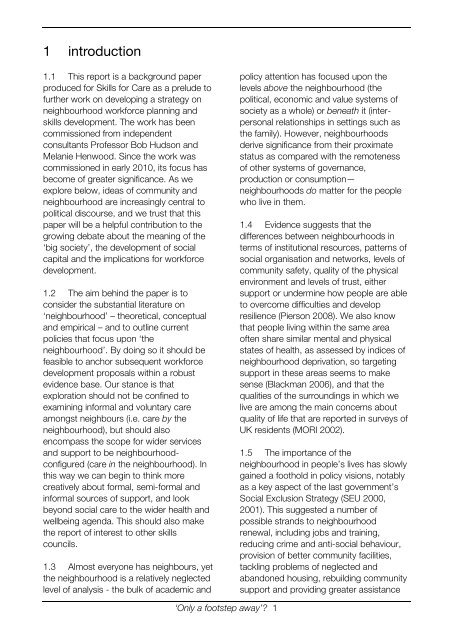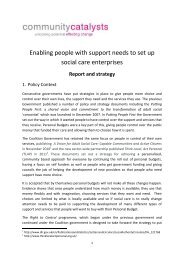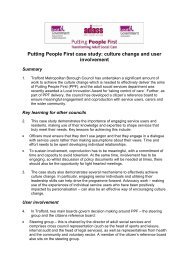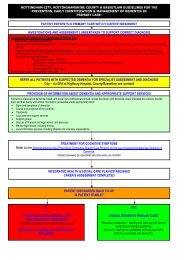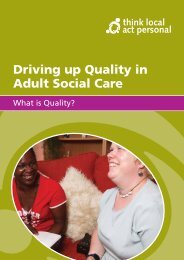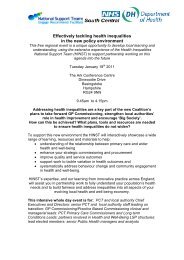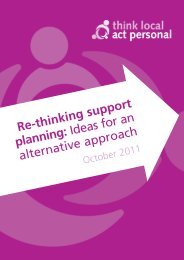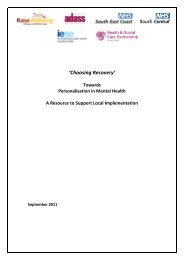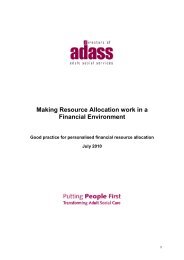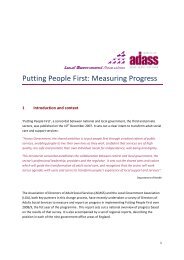'Only a footstep away' - Skills for Care - Think Local Act Personal
'Only a footstep away' - Skills for Care - Think Local Act Personal
'Only a footstep away' - Skills for Care - Think Local Act Personal
- No tags were found...
Create successful ePaper yourself
Turn your PDF publications into a flip-book with our unique Google optimized e-Paper software.
1 introduction1.1 This report is a background paperproduced <strong>for</strong> <strong>Skills</strong> <strong>for</strong> <strong>Care</strong> as a prelude tofurther work on developing a strategy onneighbourhood work<strong>for</strong>ce planning andskills development. The work has beencommissioned from independentconsultants Professor Bob Hudson andMelanie Henwood. Since the work wascommissioned in early 2010, its focus hasbecome of greater significance. As weexplore below, ideas of community andneighbourhood are increasingly central topolitical discourse, and we trust that thispaper will be a helpful contribution to thegrowing debate about the meaning of the‘big society’, the development of socialcapital and the implications <strong>for</strong> work<strong>for</strong>cedevelopment.1.2 The aim behind the paper is toconsider the substantial literature on‘neighbourhood’ – theoretical, conceptualand empirical – and to outline currentpolicies that focus upon ‘theneighbourhood’. By doing so it should befeasible to anchor subsequent work<strong>for</strong>cedevelopment proposals within a robustevidence base. Our stance is thatexploration should not be confined toexamining in<strong>for</strong>mal and voluntary careamongst neighbours (i.e. care by theneighbourhood), but should alsoencompass the scope <strong>for</strong> wider servicesand support to be neighbourhoodconfigured(care in the neighbourhood). Inthis way we can begin to think morecreatively about <strong>for</strong>mal, semi-<strong>for</strong>mal andin<strong>for</strong>mal sources of support, and lookbeyond social care to the wider health andwellbeing agenda. This should also makethe report of interest to other skillscouncils.1.3 Almost everyone has neighbours, yetthe neighbourhood is a relatively neglectedlevel of analysis - the bulk of academic andpolicy attention has focused upon thelevels above the neighbourhood (thepolitical, economic and value systems ofsociety as a whole) or beneath it (interpersonalrelationships in settings such asthe family). However, neighbourhoodsderive significance from their proximatestatus as compared with the remotenessof other systems of governance,production or consumption—neighbourhoods do matter <strong>for</strong> the peoplewho live in them.1.4 Evidence suggests that thedifferences between neighbourhoods interms of institutional resources, patterns ofsocial organisation and networks, levels ofcommunity safety, quality of the physicalenvironment and levels of trust, eithersupport or undermine how people are ableto overcome difficulties and developresilience (Pierson 2008). We also knowthat people living within the same areaoften share similar mental and physicalstates of health, as assessed by indices ofneighbourhood deprivation, so targetingsupport in these areas seems to makesense (Blackman 2006), and that thequalities of the surroundings in which welive are among the main concerns aboutquality of life that are reported in surveys ofUK residents (MORI 2002).1.5 The importance of theneighbourhood in people’s lives has slowlygained a foothold in policy visions, notablyas a key aspect of the last government’sSocial Exclusion Strategy (SEU 2000,2001). This suggested a number ofpossible strands to neighbourhoodrenewal, including jobs and training,reducing crime and anti-social behaviour,provision of better community facilities,tackling problems of neglected andabandoned housing, rebuilding communitysupport and providing greater assistance‘Only a <strong>footstep</strong> away’? 1


